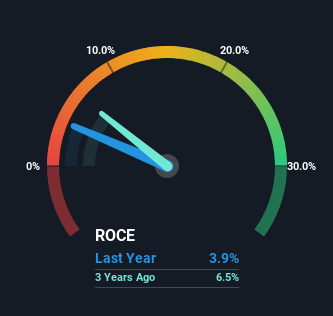- China
- /
- Oil and Gas
- /
- SHSE:600508
Here's What's Concerning About Shanghai Datun Energy Resources' (SHSE:600508) Returns On Capital
If you're looking for a multi-bagger, there's a few things to keep an eye out for. One common approach is to try and find a company with returns on capital employed (ROCE) that are increasing, in conjunction with a growing amount of capital employed. Basically this means that a company has profitable initiatives that it can continue to reinvest in, which is a trait of a compounding machine. However, after briefly looking over the numbers, we don't think Shanghai Datun Energy Resources (SHSE:600508) has the makings of a multi-bagger going forward, but let's have a look at why that may be.
What Is Return On Capital Employed (ROCE)?
Just to clarify if you're unsure, ROCE is a metric for evaluating how much pre-tax income (in percentage terms) a company earns on the capital invested in its business. To calculate this metric for Shanghai Datun Energy Resources, this is the formula:
Return on Capital Employed = Earnings Before Interest and Tax (EBIT) ÷ (Total Assets - Current Liabilities)
0.039 = CN¥645m ÷ (CN¥20b - CN¥3.1b) (Based on the trailing twelve months to March 2024).
Therefore, Shanghai Datun Energy Resources has an ROCE of 3.9%. Ultimately, that's a low return and it under-performs the Oil and Gas industry average of 11%.
View our latest analysis for Shanghai Datun Energy Resources

In the above chart we have measured Shanghai Datun Energy Resources' prior ROCE against its prior performance, but the future is arguably more important. If you're interested, you can view the analysts predictions in our free analyst report for Shanghai Datun Energy Resources .
So How Is Shanghai Datun Energy Resources' ROCE Trending?
On the surface, the trend of ROCE at Shanghai Datun Energy Resources doesn't inspire confidence. Over the last five years, returns on capital have decreased to 3.9% from 8.5% five years ago. And considering revenue has dropped while employing more capital, we'd be cautious. If this were to continue, you might be looking at a company that is trying to reinvest for growth but is actually losing market share since sales haven't increased.
On a related note, Shanghai Datun Energy Resources has decreased its current liabilities to 16% of total assets. That could partly explain why the ROCE has dropped. What's more, this can reduce some aspects of risk to the business because now the company's suppliers or short-term creditors are funding less of its operations. Since the business is basically funding more of its operations with it's own money, you could argue this has made the business less efficient at generating ROCE.
In Conclusion...
In summary, we're somewhat concerned by Shanghai Datun Energy Resources' diminishing returns on increasing amounts of capital. However the stock has delivered a 73% return to shareholders over the last five years, so investors might be expecting the trends to turn around. In any case, the current underlying trends don't bode well for long term performance so unless they reverse, we'd start looking elsewhere.
If you want to continue researching Shanghai Datun Energy Resources, you might be interested to know about the 2 warning signs that our analysis has discovered.
If you want to search for solid companies with great earnings, check out this free list of companies with good balance sheets and impressive returns on equity.
New: Manage All Your Stock Portfolios in One Place
We've created the ultimate portfolio companion for stock investors, and it's free.
• Connect an unlimited number of Portfolios and see your total in one currency
• Be alerted to new Warning Signs or Risks via email or mobile
• Track the Fair Value of your stocks
Have feedback on this article? Concerned about the content? Get in touch with us directly. Alternatively, email editorial-team (at) simplywallst.com.
This article by Simply Wall St is general in nature. We provide commentary based on historical data and analyst forecasts only using an unbiased methodology and our articles are not intended to be financial advice. It does not constitute a recommendation to buy or sell any stock, and does not take account of your objectives, or your financial situation. We aim to bring you long-term focused analysis driven by fundamental data. Note that our analysis may not factor in the latest price-sensitive company announcements or qualitative material. Simply Wall St has no position in any stocks mentioned.
About SHSE:600508
Shanghai Datun Energy Resources
Shanghai Datun Energy Resources Co., Ltd.
Excellent balance sheet with proven track record.
Market Insights
Community Narratives




